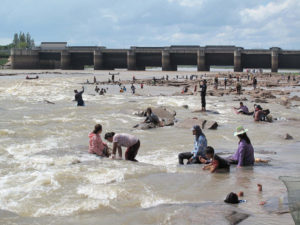 Shakeup of Electricity Generating Authority of Thailand (Egat) is long overdue
Shakeup of Electricity Generating Authority of Thailand (Egat) is long overdue
News of the Electricity Generating Authority of Thailand (Egat) signing a power purchase deal for the planned Pak Lay dam in Laos last week almost slipped under the radar, such is the media attention lavished on the government’s preparations for the next poll.
On March 20, the same day as PM Gen Prayut Chan-o-cha announced the House dissolution ahead of the general election, the state enterprise signed a power purchase contract with Gulf Energy, a Thai company which holds 40% equity in the Pak Lay Power Company, along with Chinese enterprise Sinohydro (Hong Kong) Holding Co (SHK).
The 770-megawatt (MW) Pak Lay dam will be built on the Mekong mainstream in Laos’ Xayaburi province, about 100 kilometres from the Thai-Lao border in Chiang Khan in Loei province in the Northeast. It is expected to start operations on Jan 1, 2032.
The agreement was reached despite complaints that Egat already has too much supply in reserve. An electricity glut is passed onto consumers in the form of fuel tariff (Ft) charges in electricity bills.
The so-called Ft charge is correlated with a “take-or-pay clause” in power purchase contracts that Egat has signed with power plant developers.
The clause stipulates that a buyer will take an agreed-upon amount of electricity from a seller on a certain date, or pay a set penalty fee if it does not. That means Egat must pay for electricity bought from power plants and hydro dams, even when it doesn’t use it.
The big question is why Egat keeps buying more electricity when there is already a surfeit. According to Egat’s website, total installed capacity in 2022 was 49,150 MW; actual consumption in April, known as the period of highest peak demand, was 32,250 MW. That means Thailand has a 16,900 MW surplus, equivalent to 34% of surfeit electricity.
In terms of electricity management, the international standard requires a 15% surplus in the system to prepare for electricity disruptions and ensure a reliable and smooth supply. Yet Egat’s reserve margin is twice the level that the international standard recommends.
It should not go without saying that on March 22, or two days later, the Office of the Energy Regulatory Commission (OERC) announced another increase in the Ft charge, effective from May to August.
The new Ft charge will apply a uniform electricity rate of 4.77 baht/unit for both households and businesses; usually the commercial sector clients pay a higher rate.
The OERC decided to use a single power tariff for both households and businesses after April. The new rate caused a stir as the government promised earlier to maintain the rate for household users at 4.72 baht per unit.
That will rub salt into wounds for household consumers who are suffering from a rising cost of living and a lingering economic downturn.
Electricity prices are already at record highs, following the OERC’s decision in August last year to increase the FT charge, boosting the average price by 18% to 4.72 baht per unit.
Consumer groups constantly ask the government to reform its energy policy. Last December, the Thai Consumer Council and labor unions, including the Egat union, submitted a petition signed by more than 140 organisations to the energy minister.
They demanded Egat stop approving new power plants, including buying electricity from a large hydro project in Laos; review the take-or-pay clause in its contract; and promote more alternative energy options such as a solar rooftop policy that will encourage home owners to produce electricity.
Policymakers need to heed such calls to ensure reform is more transparent and accountable.
Policymakers also must recalibrate the projection method of the Power Development Plan (PDP). The PDP, approved by the Energy Regulatory Commission, forecasts excessive energy demand scenarios that lend justification to Egat acquiring more electricity.
PDP’s projections need to be re-evaluated to make the forecasts rational. With an accurate and well-balanced PDP, the country can make sound decisions on sustainable and cheaper alternatives, rather than following the same pattern in which Egat keeps importing energy from dams on the Mekong River regardless of complaints about their environmental impact.
Policymakers also need to need to reign in the excessive reserve margin. Apart from driving up electric bills, the glut in the system puts a burden on natural resources and causes environmental and social impacts.
Ultimately, a major overhaul is required to the take-or-pay clause in Egat’s agreements. The clause is too generous to investors and too cumbersome for consumers, who bear the burden of paying for all that surfeit energy.
Pianporn (Pai) Deetes is Campaigns Director, and Gary Lee the Program Director, of the Southeast Asia Program of International Rivers, a global NGO working to defend the rights of rivers and local communities.
Source: https://www.bangkokpost.com/opinion/opinion/2539369/an-egat-shakeup-is-long-overdue


